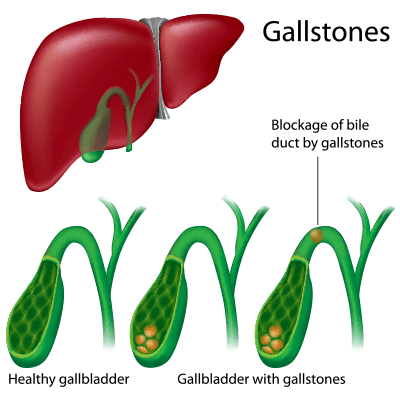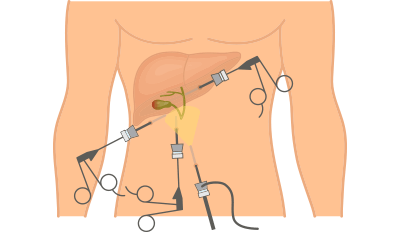Gallbladder Stones
Why Surgery is the best and safest treatment option
What would you like to know?
What is the gallbladder and what are gallstones or gallbladder stones?
The gallbladder is a storage place for digestive (bile) juice. It is tucked below the liver, in the right upper side of the abdomen. When you consume fatty foods, the gallbladder pushes bile juice into the intestine through the bile duct, to aid digestion.
Any changes in the bile juice can result in the formation of small pebble-like stones in the gallbladder, commonly called as gallstones or gallbladder stones.
Gallstones can either be as big as a golf ball or as small as a pebble. Also, there can be one large stone or many small stones or a combination of both.

Who is more prone to develop gallstones or gallbladder stones?
Gallstones may be found more commonly in:
- Pregnant women and those who are on birth control pills
- People of age >40 years
- Obese people
- People undergoing sudden weight loss
- People on carbohydrate and/or calorie-rich diet
- Those with a positive family history of gallstones
- People having a family history of gallstones
- Individuals with health issues such as diabetes and certain intestinal and liver diseases
What are the symptoms of gallstones or gallbladder stones?
Some gallstones remain ‘silent’ and do not cause any symptoms. However, others move and block the bile flow, causing a sudden pain in the upper right abdomen.
This condition, called gallbladder attack or biliary colic, can last for an hour or more and may resolve by itself. However, prolonged blockage of the bile duct can cause serious health issues
When should you consult a doctor for gallstones?
If you have any of the below symptoms, visit a surgical gastroenterologist or a gastro surgeon immediately without further delay.
- Severe pain in the abdomen lasting for more than 5 hours
- Nausea and vomiting
- Presence of fever or chills
- Yellowish discoloration of the white of the eye or skin, known as jaundice
- Discoloration of urine and stools
How are gallbladder stones diagnosed?
Based on your symptoms and physical examination, the doctor can suggest tests like an ultrasound exam, a computerized tomography (CT) scan or a magnetic resonance imaging (MRI). Sometimes, special tests and blood tests are also required.
How are gallstones or gallbladder stones treated?
Non-surgical treatments, though available, are not very effective. They are suggested only for people who are unfit for surgery.
Surgical treatment: In case of symptomatic gallstones, the gastroenterologist may recommend surgical removal of the gallbladder. This surgery, called cholecystectomy, can be done through the traditional open method or the latest and “gold-standard” laparoscopic method.“
Two types of non-surgical or noninvasive treatment options can be used to dissolve cholesterol gallstones:
- In laparoscopic cholecystectomy, the gallbladder is removed through a tiny slit in the abdomen with the help of a tiny video camera. The recovery is faster and the patient can be discharged on the next day.

- Open cholecystectomy is performed when laparoscopic cholecystectomy is not possible. Open surgery causes more pain and recovery time in the hospital is around a week.
What are the complications if Gallstones are not treated?
They are many possible complications that can occur due to gall stones, below are few that are important, which requires immediate surgery
- Infection: life threatening condition, especially if it spreads to other organs (a condition called septicemia)
- Gallbladder Rupture: Gallstones may completely block the bile duct and cause the gland to rupture
- Pancreatitis: sometimes smaller stones can pass through the bile duct and block pancreatic duck causing Pancreatitis, an extremely life threatening conditions which needs prolonged treatment and surgery
Preparing for a gallbladder surgery for gallstones (Laparoscopic cholecystectomy)
- As in the case of any Surgery, inform about your surgery at your workplace.
- Arrange for someone who can help with the daily routines while you recover.
- As you recover, your doctor will instruct you to slowly return to normal physical activity and diet.
- Adhere to the pre and post-surgery instructions recommend by your doctor to ensure a faster and complete recovery.
How to decide on the best hospital for cholecystectomy, gallbladder Surgery for stone removal?
- Look for hospitals that offer the best facilities with a highly qualified and experienced team of surgeons.
- Make sure the hospital is covered under your insurance plan.
- Check with your insurance provider if you are eligible for the coverage
What is the Cost for Cholecystectomy in Hyderabad?
In general, the cost of laparoscopic cholecystectomy in Hyderabad ranges between 50,000 INR to 1,00,000 INR. The actual cost might vary depending upon
- Presence of other health complications
- Hospital infrastructure and technology used
- Availability of skilled surgeons and advanced techniques
- length of hospital stay and category of room opted
To know more about surgery for gallstones, you can request for a call back and our gallstone specialist will call you and answer all your queries.
Related blogs you may like to read:
References:
- Gallstones, National institute of diabetes and digestive and kidney diseasborder-radius: border-radius: 50%;. Available at: https://www.niddk.nih.gov/health-information/digestive-diseases/gallstones. Accessed on Oct 27, 2017
- Gallstones. Mayo Clinics. Available at: https://www.mayoclinic.org/diseases-conditions/gallstones/diagnosis-treatment/drc-20354220. Accessed on Oct 27, 2017
- Gallstones. NHS choices. Available at: https://www.nhs.uk/Conditions/Gallstones/Pages/Introduction. aspx Accessed on Oct 27, 2017
- Njeze GE. Gallstones. Niger J Surg. 2013;19(2):49-55. Available at: https://www.ncbi.nlm.nih.gov/pmc/articles/PMC3899548/. Accessed on Oct 27, 2017









